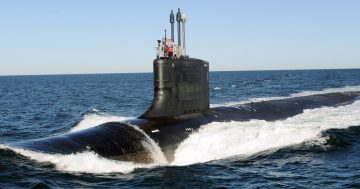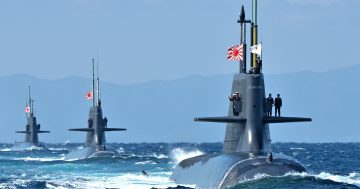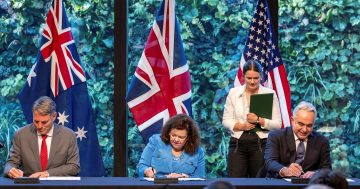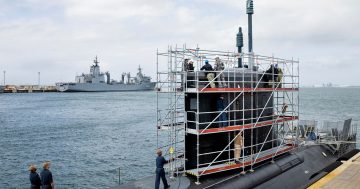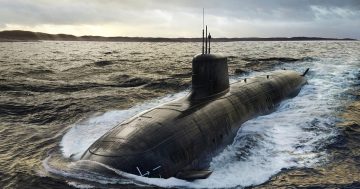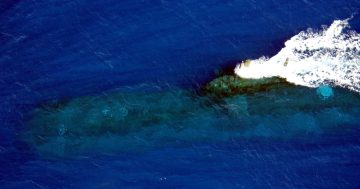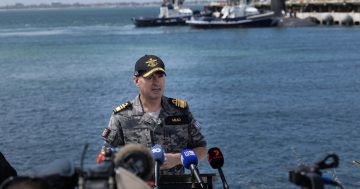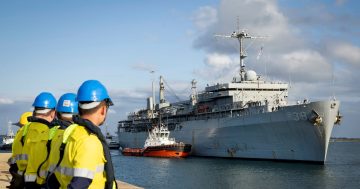Robert Ayson* says New Zealand has been sidelined in the new AUKUS security pact — but that doesn’t mean it can stand aloof if regional tensions boil over.
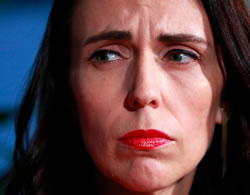 Seventy years ago Australia and New Zealand cut a deal with the United States.
Seventy years ago Australia and New Zealand cut a deal with the United States.
In exchange for accepting Washington’s generous World War II peace agreement with Tokyo while they were still concerned about Japan’s intentions, Canberra and Wellington got a security treaty.
A side-deal, at US insistence, was that the new alliance would not include the United Kingdom.
Even UK Prime Minister, Winston Churchill, who had returned to office before the Australia, New Zealand, United States Security Treaty (or ANZUS) went into effect, was unable to get the United Kingdom added to the threesome.
In 2021 the Australia-United Kingdom-United States (AUKUS) security pact appears to have turned the tables.
This time the United Kingdom is one of three, alongside Australia and the United States, and it is New Zealand’s turn to be left out.
As the feelings of surprise wear off, some New Zealand commentators have found an easy explanation for their country’s exclusion. AUKUS means that Australia was in line to get nuclear-propelled submarines.
New Zealand couldn’t belong because of its nuclear-free policy.
New Zealand Prime Minister, Jacinda Ardern (pictured) appeared to confirm this hypothesis when she confirmed nuclear-powered Australian submarines would not be permitted to operate in New Zealand’s waters.
However, there are more convincing explanations.
First, New Zealand isn’t in the submarine operating game. When (and if) the new subsurface vessels arrive, they will join a list of Australian commitments to advanced maritime combat capabilities for which New Zealand has no equivalents.
The existing (conventionally-propelled) Collins Class submarines, Air Warfare Destroyers, and Joint Strike Fighters are three other examples of this long-standing trend.
New Zealand isn’t in the same capability league that Australia is set to play in with its two AUKUS partners.
From a military technological standpoint, it would have made more sense to include Japan or the Republic of Korea than to contemplate a place for New Zealand.
Second, AUKUS will enhance Australia’s already extensive military integration with US forces. That’s a position only a very active ally of the United States could occupy.
For the United Kingdom, another close US ally, AUKUS helps build London’s Indo-Pacific and transatlantic credentials after its exit from the European Union.
It’s true New Zealand has been enjoying much warmer security relations with Washington since deploying forces to Afghanistan after 9/11. There is the Five Eyes relationship as well.
However, formal ANZUS alliance relations between the US and New Zealand have been suspended for more than three decades.
Third, AUKUS represents an elevated commitment among its three members, and especially between the US and Australia, to confront China’s growing power in maritime East Asia.
Any nuclear-powered submarines based in Australia will be an intrinsic part of a US-led order of battle for missions focused on China’s People’s Liberation Army.
Concerns about China’s impact on regional stability have been growing in New Zealand’s national security community for much of the past decade, but
Wellington still wants some separation from US-led efforts to treat China as an adversary — and from Canberra’s most strident criticisms of Beijing.
AUKUS would be a step too far in that context, but that’s still where the rub will hit New Zealand.
Since the ANZUS crisis with Washington in the mid-1980s, Governments in Wellington have come to see Australia as New Zealand’s one and only formal military ally.
Their major statements of defence policy routinely include a commitment to respond should Australia come under armed attack.
This does not mean that wherever Australia goes, New Zealand is bound to follow, but it does mean that Australia’s defence policy has an oversized impact on New Zealand’s choices.
Wellington’s public expressions of alliance unity across the Tasman don’t entertain coming to Australia’s aid in a great power conflict further north, but this doesn’t necessarily forestall the possibility of an unwanted entanglement.
When Australian Prime Minister, Scott Morrison was in Queenstown for a May summit with Ms Ardern, he was asked what his Government would expect from New Zealand if Australia got caught up in a war over the South China Sea or Taiwan.
He indicated the answer lay in the ANZUS Treaty.
Australia’s latest partnership may give New Zealand’s extra reason to be concerned about Canberra’s approach to China. Barely a day after the AUKUS announcement, Australia’s Foreign and Defence Ministers were in Washington for their annual meeting with US counterparts.
The resulting statement broke new ground for US-Australian expressions of support for Taiwan.
Minister for Defence, Peter Dutton intimated that Australia would follow the lead of the US in the event that China sought to absorb Taiwan.
A few days later, New Zealand Minister of Foreign Affairs, Nanaia Mahuta refused to be drawn on Taiwan hypotheticals involving China, the United States, and Australia.
However, she emphasised New Zealand’s close relationships with traditional partners and noted that New Zealand vessels were presently exercising in East Asian waters.
How do you stay connected but retain autonomy? Ms Ardern’s Government argues that New Zealand sees AUKUS through a “Pacific” lens, intimating some separation from the great power competition which the new partnership intensifies.
While New Zealand now refers to its wider region in Indo-Pacific terms, Ms Ardern’s definitive speech on the subject emphasised inclusiveness, multilateralism, and regional cooperation.
However, Wellington doesn’t get to write the region’s overall narrative and all manner of interpretations and connections will be made by others should the atmosphere become feverish.
Bit-by-bit, New Zealand is getting closer to the flame. It doesn’t have to be a member to be affected by the bow waves that are likely to grow now that AUKUS is here.
*Robert Ayson is Professor of Strategic Studies at Victoria University in Wellington. He can be contacted at [email protected].
This article first appeared on the PacNet website.


